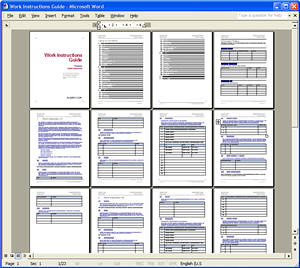Teachers all across the United States whip out The Legend of Sleepy Hollow towards the end of the every October and read the rich, poetic language aloud to the class. It's hard to understand; that why my teachers also showed an animated version of the story. I'm pretty sure the Disney version starred Goofy. The more famous film version of the story, Sleepy Hollow, is even more farfetched than the cartoon.
The Story
To be technical, The Legend of Sleepy Hollow isn't a book. It's a short story, and it's so old that you can read the whole thing for free any time (public domain). It was written by Washing Irving, and first published in 1820. Irving is well-known for another short story, Rip Van Winkle. Though Irving wrote them both in England, Sleepy Hollow is considered to be American fiction because it's set in what would become New York state.
It takes place in a Dutch settlement named Tarry Town, in an area called Sleepy Hollow. The hero of our tale is Ichabod Crane, a skinny and lanky Connecticut teacher. He would like to court Katrina Van Tassel, daughter of wealthy farmer Baltus Van Tassel. Abraham Van Brunt, known as "Brom Bones," would also like to court her. They each attempt to woo her at a party inside the Van Tassel home.
Ichabod leaves the party alone and finds himself being chased by the Headless Horseman, an enigmatic figure who is supposed to be the ghost of Hessian (German) trooper whose head was shot off during the Revolutionary War. Every night, the Headless Horseman rides through Sleepy Hollow in search of his missing head.
The reader learns that Ichabod disappears after the night of the party, and from then on out Brom Bones has a "knowing" expression on his face whenever the man's name is mentioned. Brom Bones goes on to marry Katrina, as he wished.
The story never tells us who the Headless Horseman is, exactly, but seems to imply that it was Brom chasing after Ichabod that night.
The Film(s)
It's a very old story, and naturally The Legend of Sleepy Hollow has been adapted many, many times. There are several animated versions, but even before these were viewed it became a silent film in 1922. Re-titled The Headless Horseman (because he's the best part of the story), it had Will Rogers in the role of Crane. I haven't seen it, but a few summaries point toward a fairly faithful adaptation. Crane is indeed a teacher and he does fall in love with the girl, but in this version Bones isn't his only enemy. In 1922, the whole town despises Crane, so no one knows who was really the Horseman.
By far the most well-known adaptation of the story is Tim Burton's 1999 joint Sleepy Hollow, which is probably the most unfaithful version you can find (but what else do we expect from Tim Burton?). Ichabod Crane becomes gorgeous Johnny Depp instead of a lanky teacher; he's also turned into a police investigator.
This time around, there's a definite supernatural quality to the Horseman (played by the scariest actor ever, Christopher Walken). Christina Ricci is Katrina, and Capser Van Dien is Brom Bones. Crane is in town to investigate a series of strange murders, perpetrated by the ghostly Horseman.
Ichabod is highly skeptical of the villagers' explanation. He becomes a guest of the Van Tassels and becomes attracted to Katrina, like he's supposed to. He travels into the woods and finds the Horseman's grave and the Tree of the Dead. Eventually, he discovers that Lady Van Tassel, Katrina's stepmother, is controlling the Horseman for a revenge plot involving land. Crane has to find the Horseman's skull to end his reign of terror, which he does. Crane lives in this version, and takes Katrina with him back to New York.
What Got Adapted?
It might be easier to tell you what didn't get adapted in the transition between book and film for Sleepy Hollow. The most accurate part of the book is the setting, and even that's questionable. Obviously, some of the additions are necessary. Irving's story is pretty short, so it's understandable that characters had to be invented and new back stories revealed...but there were huge changes from the story in the Burton version, and I don't really think they were necessary.
Burton does include the party that's at the heart of the original story, and the tension between Crane and Brom is briefly touched upon. But stunningly, Brom dies in this version. He does dress up as the Horseman to frighten Crane, and ends up being killed by the real Horseman. This gigantic diversion from the original is only the tip of the interpretation iceberg.
Crane blacks out several times in the flick, and in this version the Horseman is well and truly the ghost of a soldier who has indeed lost his head. Walken is fantastic on film as the Horseman, because he's frightening no matter what he's doing, but it's a big deviation from the original tale.
Irving's story is filled with color. He describes food and clothing, and paints his world in bright hues. Tim Burton does exactly the opposite. Even the trees in Sleepy Hollow look gray, and honestly no one would live in this horrible place. Everything is dull and dirty and terrible-looking, and yet we're supposed to believe it's farming country. The ending is quite different, and there's nothing mysterious about it at all. In the story, Crane dies and we're never really sure who killed him (but we think it's Brom). In the film, Brom is dead and Crane actually gets the girl -- but with Depp playing the leading man, moviegoers surely wouldn't accept anything else.
And besides, it wasn't even an original story when Irving wrote it. The Legend of Sleepy Hollow is based on an even older German folktale that was set in New York state, and recorded first by Karl Musäus.

























